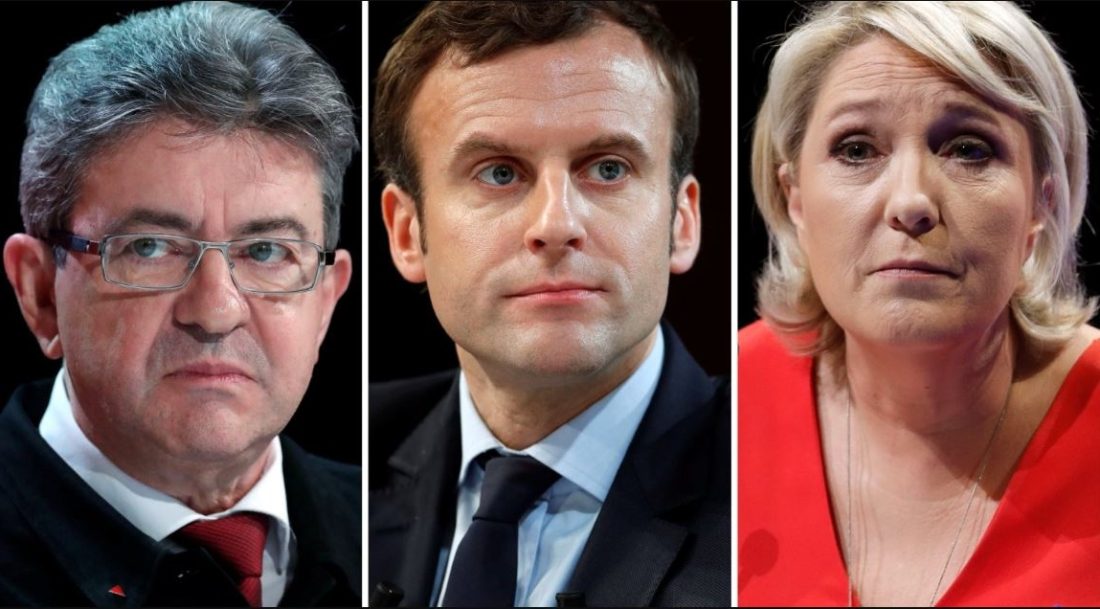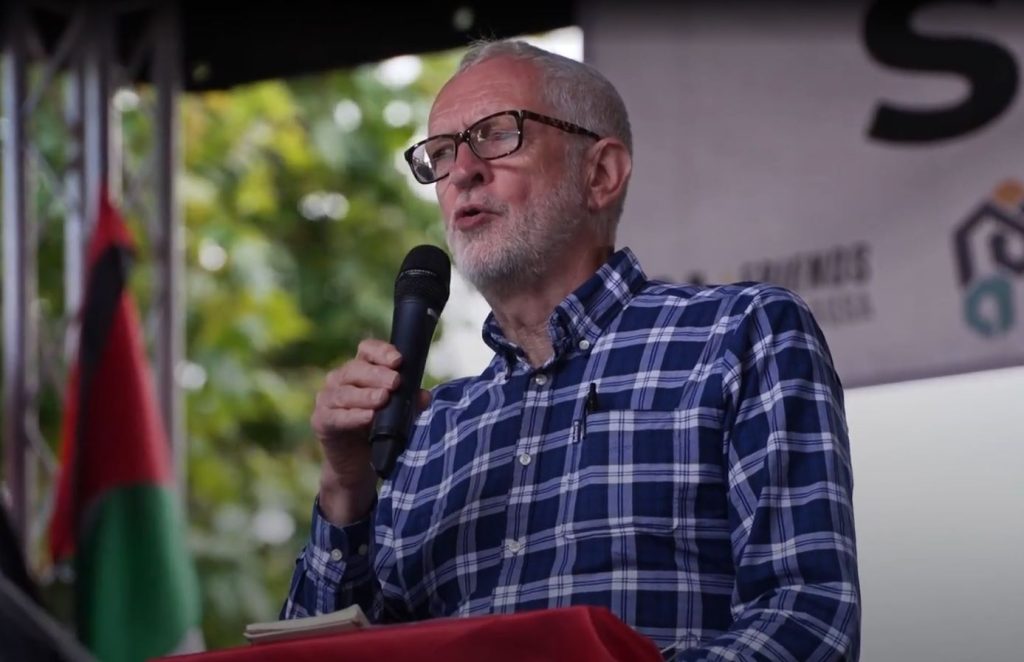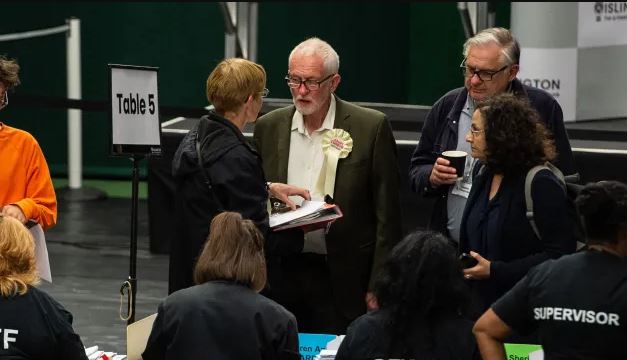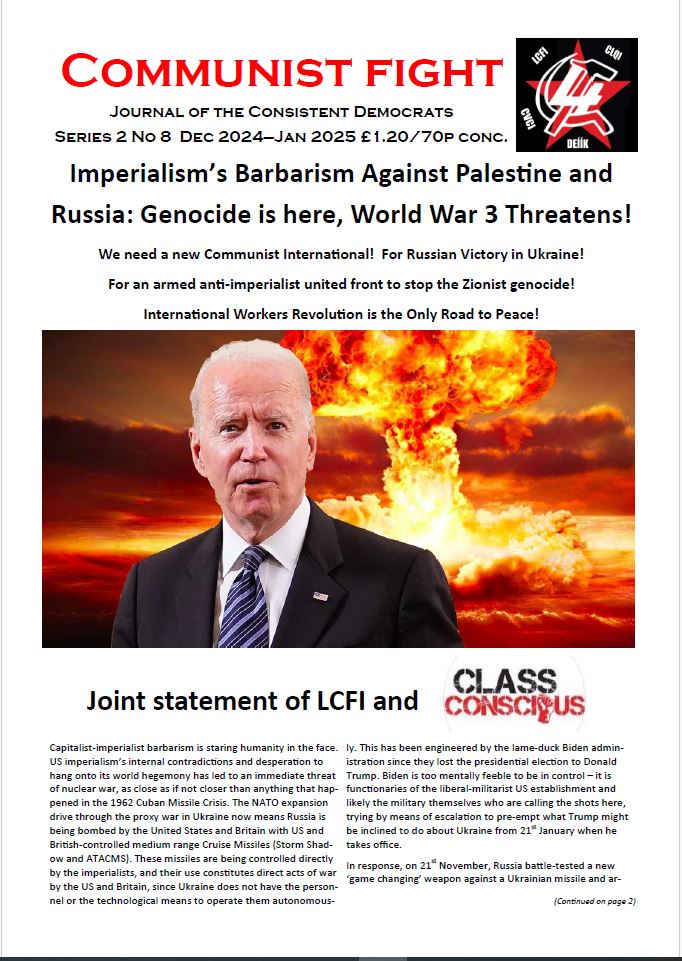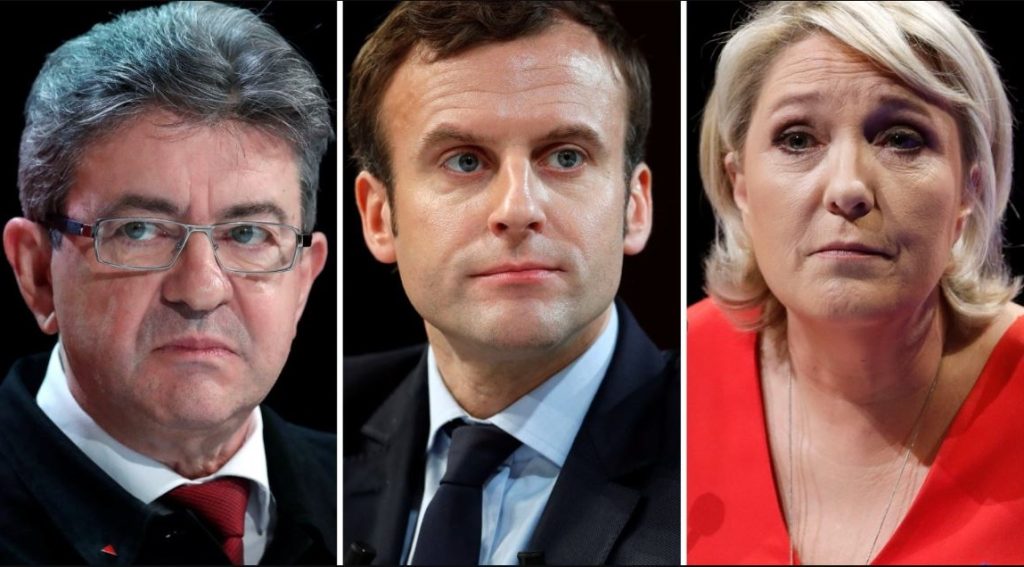
Joint Statement of LCFI and ClassConscious.org
President Emmanuel Macron’s gamble in calling new elections to the French National Assembly as an attempted means to counter the victory of the far right Rassemblement National – (RN) or National Rally, formerly the Front Nationale (National Front) of Marine Le Pen in the June European Election, has opened a new political situation. It was an act of desperation by Macron whose ‘centrist’ base of support has ebbed away due to his own vicious attacks on the working class over the last period, outrageously raising the pension age from 60 to 64 and ramming it through using emergency clauses in the constitution without a parliamentary vote. His warmongering in Ukraine, even earlier proposing to openly send French troops into battle against Russia, was almost designed to provoke war with Russia. Then there are his vain attempts to supress protests against the genocide in Gaza and his pandering to Zionist and French nativist Islamophobia and anti-migrant agitation. These things have completely discredited his regime and fuelled the growth of the far right in the seeming absence of a potent left movement.
So, after the shock of the Euro-Election, he dissolved the National Assembly. The first-round victory of Le Pen’s Party meant that the gamble appeared to have failed big time. But the New Popular Front (NPF), launched by the La France Insoumise (France Unbowed – LFI) party led by the left-wing social-democratic politician Jean-Luc Mélenchon, which included the Socialist Party, Communist Party and Greens, was galvanised by the rise of Le Pen’s party. It launched a campaign of tactical voting to keep Le Pen’s Party from getting a parliamentary majority. Supporters of the NPF and Macron’s Party systematically withdrew their candidates in constituencies where they came third in the first round with their bloc partner having gained second place. This class-collaborationist tactic by the half-formed NPF, itself a class collaborationist alliance, achieved a short-term tactical victory, which in some ways appeared superficially to vindicate Macron’s calling of a snap election. In terms of seats, the NPF came first, Macron’s Renaissance Party came second, with the far right in third place. In terms of seats, that is, though with nowhere near a parliamentary majority for any of them.
But in terms of votes, the RN came first more decisively in the second round than in the first. It increased its vote from 33.21% in the first round to 37.06% in the second round. Quite a considerable increase. Which means that while the Popular Frontism of the left and Macron may by tactical voting have thwarted the RN in parliamentary terms, they strengthened Le Pen in terms of popular support. Which has not solved the problem therefore, it just postponed the decisive conflict until later. Indeed, far from being a great victory for Mélenchon either, the NPF’s vote fell from 28.21% in the first round to 25.80% in the second round. Whereas Macron’s Party gained marginally, going from 21.28% in the first round to 24.53% in the second round.
In parliamentary terms, the result for now is deadlock. No bloc has anything like a majority. Macron, as president, is likely to be desperately trying to fit together a coalition for months. He may well not succeed, as despite the parliamentary arithmetic, actual popular votes and the social forces behind them put enormous pressure on members of the National Assembly. And if they don’t succeed, there could even be another election at some point. Le Pen could still benefit from this.
One of the main reasons for Marine Le Pen’s rise is her opposition to France’s support for NATO’s lost war against Russia in Ukraine. The French proletariat simply opposes being dragged like cannon fodder by imperialism into war. A minority of the ruling class sees the far right as a battering ram to push a more nationalist agenda at odds with the mainstream pro-EU ‘globalist’ trend that is deeply involved in the US-led proxy war in Ukraine. That wing is using verbal opposition to French involvement in Ukraine as a means to garner support from part of the working class, particularly in more provincial towns that are more conservative and less ethnically diverse than the biggest cities. As well as mobilising racist anti-migrant sentiment, which Macron had already adapted to to try to ‘disarm’ his far-right opponents by stealing their clothes.
Macron introduced new legislation limiting access to citizenship, rights to social benefits, and family reunification for migrants, as well as deportation for ‘immigrants’ if they commit crimes…. even if being convicted as an adult, they’ve been living in the country from childhood. The issue of work visas for irregular migrants has been curtailed. Overseas study visas are also restricted. It all sounds very much like the kind of laws introduced in Britain by the Tories and Brexiteers over the past decade, except that Macron is as pro-EU as any politician can be. It shows how the nationalist wing of the bourgeoisie, using the fascists as a battering ram, can induce its critics to pander to its racist-nationalist agenda. Migrants are attacked, Muslims are vilified, with the niqab banned in public spaces. In France, 50% of the prison population is Muslim, which is disproportionate as the Muslim population in France is approximately 10%..
The NPF’s circumstantial victory only postpones Le Pen’s victory because the NPF’s positions on the war in Ukraine are very close to Macron’s unpopular positions of increasing French support for Ukraine, sending more French weapons and military instructors to the war. By associating itself with imperialism in the Ukrainian War, the NPF plays the same geopolitical game as Macron, the game of pushing the proletariat politically into the arms of the “fascist-pacifist” extreme right. This is the NPF’s biggest crime at the moment. This crime, if not renounced and the opposite policy adopted and fought for by the workers parties involved, will pave the way for Le Pen’s rise to the French government. A disaster particularly for the sections of the working class with an immigrant origin.
This is at most a tactical defeat for Le Pen, but not a strategic one. The short-term tactic may even strengthen Le Pen strategically. She will be very dangerous in the 2027 Presidential Election, which may well be between her and Mélenchon, as Macron no longer inspires popular support. Mélenchon’s LFI party proposes some reasonable reforms, to restore pensions, raise wages and benefits, radically reverse austerity. It is also in theory hostile to NATO. On international questions Mélenchon is a mixed bag. On Ukraine, Mélenchon party condemned the Special Military Operation (SMO) that began in February 2022 as a so-called ‘invasion’ of Ukraine, echoing imperialist propaganda. Though he opposes the warmongering on a pacifist basis, in effect:
“’We stand for Ukraine’s restoring its territorial integrity. But it should be done politically, but not by means of military force,’ he said, adding that the idea of delivering strikes inside Russia is ‘absurd.’
https://tass.com/world/1814251?
There is no mention of the rights of the overwhelmingly Russian-speaking people of the Donbass in this. They voted against Ukraine’s ‘territorial integrity’ against a far-right regime in Kiev that began to supress their language rights in 2014. In this concept, territorial integrity overrides the democratic rights of the people who live in a state – hardly a socialist position. Though he did have a more sympathetic response to the separation of Crimea to join Russia in 2014, and he has called the Kiev regime ‘neo-Nazis’.
But at least on Syria he was quite supportive of the Russian intervention and hostile to Turkey’s intervention of the side of pro-imperialist mercenary jihadists. This may reflect an older pro-Russian position that is part of French bourgeois politics. He is rather like Jeremy Corbyn over Zionism and promises to recognize Palestine if LFI gains power. However, he is hostile to Iran – on the supposed grounds that Iran is seeking to destroy Israel in some bad way. A soft pro-Zionist position, it seems.
The Communist Party in France echo Macron’s denunciation of Russia, saying the intervention was a “criminal decision…” involving “…aggression against the sovereignty of the people of Ukraine.” Though they make the usual calls for peace, negotiations, etc, they blame Russia for NATO’s aggressive expansion in the East. The Socialist Party is for the war drive. Its leader Faure was quoted as saying: “If we let Russia win, the risk we all run is to find ourselves in a situation where Russia will not stop.”
A joint statement of the Socialist Party and Greens is quoted by the Spectator as saying:
“‘Our line is clear: we support Ukraine, we support the delivery of arms, we support Ukraine’s membership of the European Union.”
https://www.spectator.co.uk/article/frances-political-upheaval-is-bad-news-for-ukraine/
The ‘centre-left’ Place Publique, which is also part if the NPF, campaigns for ‘aid’ to Ukraine. The predominant policy in the NPF bloc is support for the same warmongering as Macron. And by his bloc with them, Mélenchon associates his party with this. While it has to be acknowledged that many in this bloc are driven by justified anti-fascist sentiment against the RN, at the same time the warmongering policy of most in the NPF over Ukraine is fuelling the growth in popular support of the same RN.
If is highly doubtful that Mélenchon will be able to keep together his NPF for the 2027 presidential election, and that he would be able to generate the popular support to seriously thwart Le Pen even if he did. That will also be a two-round election, and it’s not clear who would be able to combat Le Pen. What is clear is that class collaboration, though it practically blocked the RN from gaining a majority and the premiership now, also caused a decline in support for itself vis-à-vis Macron in the second round. Popular fronts historically were an obstacle to revolution including in French history, and elsewhere like Chile, and the precondition for Macron leading a real struggle against Le Pen for the popular vote is a break with class collaboration, with the petit bourgeois Greens, let alone Macron’s bourgeois neoliberal party who he effectively endorsed on the second round by using tactical voting in this manner.
The precondition for serious struggle against Le Pen’s party is a break with popular frontism. In the second round of a presidential election, there is no way to evade the popular vote. But a break with popular frontism in France means a break with reformism, as within a reformist framework, the French electoral system makes popular frontism a practical temptation whenever the question of power arises. It may be that there is some kind of surge toward LFI before 2027, but if it does not break decisively with Macron’s warmongering and this strongly pro-war popular front, Mélenchon would be at best a candidate for the role of Salvador Allende.
Popular fronts, whether with the Greens or Macron’s Renaissance, are a trap for the working class. We demand that Mélenchon, the Socialist Party and the Communist Party, break with Greens, refuse any political bloc with non-working-class forces, and fight too and nail against the war in Ukraine. The key indicator of the deceptive nature of this popular front is its support for Biden/Macron’s proxy war in Ukraine. In breaking with popular frontism, and this filthy war, they would actually undermine some of the support for the RN.
We need a party that opposes the threat of imperialist war against Russia and China, that defends migrant workers tooth and nail against the far right and Macron alike, and which fights against all the neoliberal attacks on the working class. For workers defence guards to defend victims of fascist terrorism! Down with Macron’s war in Ukraine – defend Russia, the Donbass and Crimea against Macron and his Nazi friends! Down with Le Pen, break with the bourgeoisie, no Popular Fronts – for a government of all the workers parties, LFI, SP, CP, on an anti-capitalist programme!

